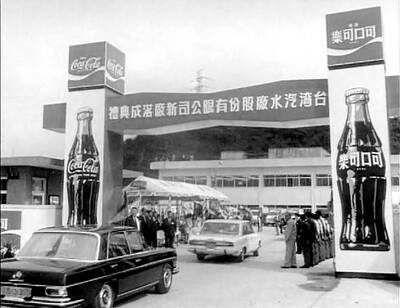“The primary thing that I want people to do is look at them and go ‘how pretty.’ It’s like you heard a song and went ‘that sounds nice,’ and then you start thinking about the lyrics afterwards. So the first thing I want is that they are attractive to the eyes.”
This was how Mark Caltonhill described his unique and arresting rebus-like poems, which update the traditional Chinese spring couplet, or chunlian (春聯), with the help of a digital camera.
“Basically they are two stanzas, seven lines in each,” he said. “Seven ideas, seven concepts, seven lines of poetry in each of the two stanzas with lots of correspondence.”
More than a year in the making, the 10 couplets — collectively called The Malarkey Phenomenon — are currently on display and sale at Citizen Cain, a restaurant on Dongfeng Street (東豐街), which will host a reception for the show this Sunday beginning at 1pm. Interspersed among the couplets will be Malarkey’s Amusement Park, a series of playful poems on photographs.
The exhibition also marks the soft launch of Caltonhill’s self-published book of writing, also called Malarkey’s Amusement Park, as well as a call for poetry and verse for a forthcoming compilation of writing by expats living in Taiwan that Caltonhill plans to publish in the summer of next year (submissions can be forwarded to jiyue.publications@gmail.com).
Caltonhill, who has lived in Taiwan on and off since 1992, working as a performer, translator and writer (his book Private Prayers and Public Parades was reviewed on Page 18 of the Nov. 9, 2003 edition of the Taipei Times), employed his considerable knowledge of Taiwanese culture, Chinese characters (he has a master’s degree in Chinese from the University of Edinburgh) and his travels throughout the country to create the couplets, which were printed on rice paper and professionally framed as silk scrolls.
HuHu (湖滬), based on a trip Caltonhill took to Penghu (澎湖), is fairly representative of the hanging scrolls in how the traditional couplet form is altered (digital images replace stylized characters) to investigate or meditate on a variety of themes.
In the couplet, Caltonhill juxtaposes images of Chinese characters either standing alone or in profusion — in one line characters have been spray-painted on a plastic container, in another they are on a menu written on a wall — with images of Penghu.
The second character in the Chinese word for Penghu, hu (湖), forms the first line on the right-hand scroll. The top line of the left-hand scroll is the Chinese character hu (滬), which means weir.
“It is a poem working on two levels,” Caltonhill said. “Going to Penghu and seeing all these things and the human relationship with his environment.”
The visual language that gives the couplets meaning is also what makes them difficult to unravel.
“To decipher the poems you need to know where [pictures of] the characters were taken,” he said.
The references are indeed idiosyncratic, and unless you’ve been to the restaurant or prison wall the images capture, it’s difficult to see any immediate deeper meaning — though Caltonhill pointed out that this was his intention. Written proficiency in Chinese and a deep knowledge of Taiwan’s history are helpful when deciphering the scrolls, so if your Chinese isn’t up to snuff be sure to bring along a friend who can point out the homophones.
Although the “lyrics” are written in Chinese, the visual music reveals a playful understanding of a traditional poetic form that rewards repeated viewing.
Those wishing to submit poetry, lyrics or verse to Caltonhill’s publishing company JiYue Publications (霽月出版社), which he established as a result of his “frustrations trying to get books published in Taiwan and the similar experiences of other writers,” should send submissions to jiyue.publications@gmail.com.
EXHIBITION NOTES:
WHAT: A Double Dose of Malarkey
WHERE: Citizen Cain, 67, Dongfeng St, Taipei City (台北市東豐街67號). Tel: (02) 2708-4557
WHEN: Opening reception on Sunday at 1pm ; exhibit runs through Feb. 28, 2009. Citizen Cain is open daily from 6pm to midnight

July 28 to Aug. 3 Former president Chiang Kai-shek (蔣介石) reportedly maintained a simple diet and preferred to drink warm water — but one indulgence he enjoyed was a banned drink: Coca-Cola. Although a Coca-Cola plant was built in Taiwan in 1957, It was only allowed to sell to the US military and other American agencies. However, Chiang’s aides recall procuring the soft drink at US military exchange stores, and there’s also records of the Presidential Office ordering in bulk from Hong Kong. By the 1960s, it wasn’t difficult for those with means or connections to obtain Coca-Cola from the

No one saw it coming. Everyone — including the Chinese Nationalist Party (KMT) — expected at least some of the recall campaigns against 24 of its lawmakers and Hsinchu Mayor Ann Kao (高虹安) to succeed. Underground gamblers reportedly expected between five and eight lawmakers to lose their jobs. All of this analysis made sense, but contained a fatal flaw. The record of the recall campaigns, the collapse of the KMT-led recalls, and polling data all pointed to enthusiastic high turnout in support of the recall campaigns, and that those against the recalls were unenthusiastic and far less likely to vote. That

Taiwan is today going to participate in a world-first experiment in democracy. Twenty-four Chinese Nationalist Party (KMT) lawmakers will face a recall vote, with the results determining if they keep their jobs. Some recalls look safe for the incumbents, other lawmakers appear heading for a fall and many could go either way. Predictions on the outcome vary widely, which is unsurprising — this is the first time worldwide a mass recall has ever been attempted at the national level. Even meteorologists are unclear what will happen. As this paper reported, the interactions between tropical storms Francisco and Com-May could lead to

A couple of weeks ago the parties aligned with the People’s Republic of China (PRC), the Chinese Nationalist Party (KMT) and the Taiwan People’s Party (TPP), voted in the legislature to eliminate the subsidy that enables Taiwan Power Co (Taipower) to keep up with its burgeoning debt, and instead pay for universal cash handouts worth NT$10,000. The subsidy would have been NT$100 billion, while the cash handout had a budget of NT$235 billion. The bill mandates that the cash payments must be completed by Oct. 31 of this year. The changes were part of the overall NT$545 billion budget approved